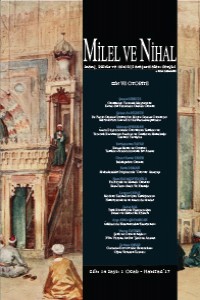Öz
Kutsal metinler ve otorite arasındaki ilişki sorunu, genel olarak, kökenci ve tarihsel
yaklaşımlar
içinde birbirine ilk elde zıt görünen formlarda ele alınmaktadır. Ancak bu ilişki
içinde asıl sorun, kutsal metinlerin otoritesini bir imge veya maskeye dönüştürerek
kendisini gizleyen yorum geleneklerinin veya stratejilerinin otoriter karaktere
bürünmesiyle ortaya çıkmaktadır.
Anahtar Kelimeler
Kaynakça
- Barlas, Asma. “Text, Tradition, and Reason: Qur’anic Hermeneutics and Sexual Politics” Cardozo Law School, Yeshiva University, October 10-12, 2004. http://rojavaplan.com/uploads/library/gender/hermeneutics_recovery.pdf (26.06.2017).
- Engelke, Matthew. A Problem of Presence: Beyond Scripture in an African Church, University of California Press, Berkeley, 2007.
- Foucault, Michel. Bu bir Pipo Değildir, Çev. Selahattin Hilav, YKY: İstanbul, 2016.
- Kim, Donghyun, Reason, Tradition, and Authority: A Comparative Study of Habermas and Gadamer, http://theses.gla.ac.uk/2812/1/2011KIMphd.pdf (26.06.2017).
- Nejjar, Fauzi M. “Islam and Modern Democracy” The Review of Politics, Vol. 20, No. 2 (Apr., 1958), ss. 164-180 https://edocs.uis.edu/Departments/LIS/Course_Pages/LIS411/readings/Najjar_Islam_and_Modern_Democracy.pdf (26.06.2017).
Öz
The authority that
has been accepted as a sacred phenomenon by many The problem of relationship between sacred texts and authority is
generally explored within two seemingly opposite approaches: Genetic and
historical. However, the essential problem, which can be grasped within these
approaches, reveals itself when interpretive traditions or strategies of
interpretation of sacred texts transform themselves into an authoritarian
character which hides itself behind the politics of turning sacred texts to an
image or mask under the label of ‘sacred authority’.
Anahtar Kelimeler
Kaynakça
- Barlas, Asma. “Text, Tradition, and Reason: Qur’anic Hermeneutics and Sexual Politics” Cardozo Law School, Yeshiva University, October 10-12, 2004. http://rojavaplan.com/uploads/library/gender/hermeneutics_recovery.pdf (26.06.2017).
- Engelke, Matthew. A Problem of Presence: Beyond Scripture in an African Church, University of California Press, Berkeley, 2007.
- Foucault, Michel. Bu bir Pipo Değildir, Çev. Selahattin Hilav, YKY: İstanbul, 2016.
- Kim, Donghyun, Reason, Tradition, and Authority: A Comparative Study of Habermas and Gadamer, http://theses.gla.ac.uk/2812/1/2011KIMphd.pdf (26.06.2017).
- Nejjar, Fauzi M. “Islam and Modern Democracy” The Review of Politics, Vol. 20, No. 2 (Apr., 1958), ss. 164-180 https://edocs.uis.edu/Departments/LIS/Course_Pages/LIS411/readings/Najjar_Islam_and_Modern_Democracy.pdf (26.06.2017).
Ayrıntılar
| Bölüm | Makaleler |
|---|---|
| Yazarlar | |
| Yayımlanma Tarihi | 29 Haziran 2017 |
| Gönderilme Tarihi | 29 Haziran 2017 |
| Yayımlandığı Sayı | Yıl 2017 Cilt: 14 Sayı: 1 |


